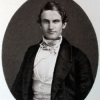Francis Parkman

Francis Parkman
Francis Parkman, Jr.was an American historian, best known as author of The Oregon Trail: Sketches of Prairie and Rocky-Mountain Life and his monumental seven-volume France and England in North America. These works are still valued as historical sources and as literature. He was also a leading horticulturist, briefly a professor of Horticulture at Harvard University and author of several books on the topic. Parkman was a trustee of the Boston Athenæum from 1858 until his death in 1893...
NationalityAmerican
ProfessionHistorian
Date of Birth16 September 1823
CountryUnited States of America
America, when it became known to Europeans, was, as it had long been, a scene of wide-spread revolution.
The young nobles, of whom there were many, were volunteers, who had paid their own expenses in expectation of a golden harvest, and they chafed in impatience and disgust. The religious element in the colony-unlike the former Huguenot emigration to Brazil--was evidently subordinate. The adventurers thought more of their fortunes than of their faith.
The monk, the inquisitor, and the Jesuit were lords of Spain,- sovereigns of her sovereign, for they had formed the dark and narrow mind of that tyrannical recluse. They had formed the minds of her people, quenched in blood every spark of rising heresy, and given over a noble nation to a bigotry blind and inexorable as the doom of fate. Linked with pride, ambition, avarice, every passion of a rich, strong nature, potent for good and ill, it made the Spaniard of that day a scourge as dire as ever fell on man.
When America was first made known to Europe, the part assumed by France on the borders of that new world was peculiar, and is little recognized. While the Spaniard roamed sea and land, burning for achievement, red-hot with bigotry and avarice, and while England, with soberer steps and a less dazzling result, followed in the path of discovery and gold-hunting, it was from France that those barbarous shores first learned to serve the ends of peaceful commercial industry.
Humanity, morality, decency, might be forgotten, but codfish must still be had for the use of the faithful in Lent and on fast days.
It was a rich and gorgeous sunset - an American sunset; and the ruddy glow of the sky was reflected from some extensive pools of water among the shadowy copses in the meadow below.
In one point the plan was fatally defective, since it involved the deadly enmity of a race whose character and whose power were as yet but ill understood,--the fiercest, boldest, most politic, and most ambitious savages to whom the American forest has ever given birth.
The most momentous and far-reaching question ever brought to issue on this continent was: Shall France remain here, or shall she not?
Versailles was a gulf into which the labor of France poured its earnings; and it was never full.
Not a breath of air stirred over the free and open prairie; the clouds were like light piles of cotton; and where the blue sky was visible, it wore a hazy and languid aspect.
The Spanish voyager, as his caravel ploughed the adjacent seas, might give full scope to his imagination, and dream that beyond the long, low margin of forest which bounded his horizon lay hid a rich harvest for some future conqueror; perhaps a second Mexico with its royal palace and sacred pyramids, or another Cuzco with its temple of the Sun, encircled with a frieze of gold. Haunted by such visions, the ocean chivalry of Spain could not long stand idle.
We were now, as I before mentioned, upon this St. Joseph's trail. It was evident, by the traces, that large parties were a few days in advance of us; and as we too supposed them to be Mormons, we had some apprehension of interruption.
Many of the Iroquois and Huron houses were of similar construction, the partitions being at the sides only, leaving a wide passage down the middle of the house.
Fort Leavenworth is in fact no fort, being without defensive works, except two block-houses.